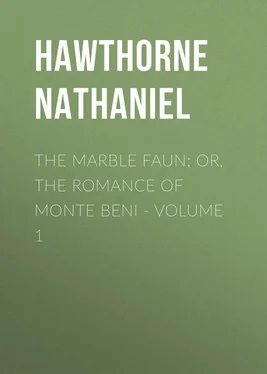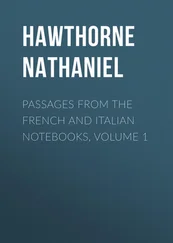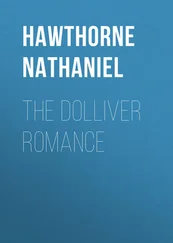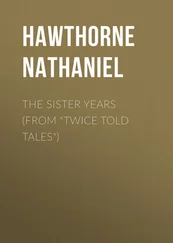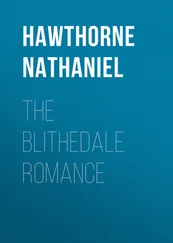Nathaniel Hawthorne - The Marble Faun; Or, The Romance of Monte Beni - Volume 1
Здесь есть возможность читать онлайн «Nathaniel Hawthorne - The Marble Faun; Or, The Romance of Monte Beni - Volume 1» — ознакомительный отрывок электронной книги совершенно бесплатно, а после прочтения отрывка купить полную версию. В некоторых случаях можно слушать аудио, скачать через торрент в формате fb2 и присутствует краткое содержание. Жанр: literature_19, foreign_antique, foreign_prose, на английском языке. Описание произведения, (предисловие) а так же отзывы посетителей доступны на портале библиотеки ЛибКат.
- Название:The Marble Faun; Or, The Romance of Monte Beni - Volume 1
- Автор:
- Жанр:
- Год:неизвестен
- ISBN:нет данных
- Рейтинг книги:3 / 5. Голосов: 1
-
Избранное:Добавить в избранное
- Отзывы:
-
Ваша оценка:
- 60
- 1
- 2
- 3
- 4
- 5
The Marble Faun; Or, The Romance of Monte Beni - Volume 1: краткое содержание, описание и аннотация
Предлагаем к чтению аннотацию, описание, краткое содержание или предисловие (зависит от того, что написал сам автор книги «The Marble Faun; Or, The Romance of Monte Beni - Volume 1»). Если вы не нашли необходимую информацию о книге — напишите в комментариях, мы постараемся отыскать её.
The Marble Faun; Or, The Romance of Monte Beni - Volume 1 — читать онлайн ознакомительный отрывок
Ниже представлен текст книги, разбитый по страницам. Система сохранения места последней прочитанной страницы, позволяет с удобством читать онлайн бесплатно книгу «The Marble Faun; Or, The Romance of Monte Beni - Volume 1», без необходимости каждый раз заново искать на чём Вы остановились. Поставьте закладку, и сможете в любой момент перейти на страницу, на которой закончили чтение.
Интервал:
Закладка:
Perhaps it is the very lack of moral severity, of any high and heroic ingredient in the character of the Faun, that makes it so delightful an object to the human eye and to the frailty of the human heart. The being here represented is endowed with no principle of virtue, and would be incapable of comprehending such; but he would be true and honest by dint of his simplicity. We should expect from him no sacrifice or effort for an abstract cause; there is not an atom of martyr’s stuff in all that softened marble; but he has a capacity for strong and warm attachment, and might act devotedly through its impulse, and even die for it at need. It is possible, too, that the Faun might be educated through the medium of his emotions, so that the coarser animal portion of his nature might eventually be thrown into the background, though never utterly expelled.
The animal nature, indeed, is a most essential part of the Faun’s composition; for the characteristics of the brute creation meet and combine with those of humanity in this strange yet true and natural conception of antique poetry and art. Praxiteles has subtly diffused throughout his work that mute mystery, which so hopelessly perplexes us whenever we attempt to gain an intellectual or sympathetic knowledge of the lower orders of creation. The riddle is indicated, however, only by two definite signs: these are the two ears of the Faun, which are leaf shaped, terminating in little peaks, like those of some species of animals. Though not so seen in the marble, they are probably to be considered as clothed in fine, downy fur. In the coarser representations of this class of mythological creatures, there is another token of brute kindred, — a certain caudal appendage; which, if the Faun of Praxiteles must be supposed to possess it at all, is hidden by the lion’s skin that forms his garment. The pointed and furry ears, therefore, are the sole indications of his wild, forest nature.
Only a sculptor of the finest imagination, the most delicate taste, the sweetest feeling, and the rarest artistic skill — in a word, a sculptor and a poet too — could have first dreamed of a Faun in this guise, and then have succeeded in imprisoning the sportive and frisky thing in marble. Neither man nor animal, and yet no monster, but a being in whom both races meet on friendly ground. The idea grows coarse as we handle it, and hardens in our grasp. But, if the spectator broods long over the statue, he will be conscious of its spell; all the pleasantness of sylvan life, all the genial and happy characteristics of creatures that dwell in woods and fields, will seem to be mingled and kneaded into one substance, along with the kindred qualities in the human soul. Trees, grass, flowers, woodland streamlets, cattle, deer, and unsophisticated man. The essence of all these was compressed long ago, and still exists, within that discolored marble surface of the Faun of Praxiteles.
And, after all, the idea may have been no dream, but rather a poet’s reminiscence of a period when man’s affinity with nature was more strict, and his fellowship with every living thing more intimate and dear.
CHAPTER II
“Donatello,” playfully cried Miriam, “do not leave us in this perplexity! Shake aside those brown curls, my friend, and let us see whether this marvellous resemblance extends to the very tips of the ears. If so, we shall like you all the better!”
“No, no, dearest signorina,” answered Donatello, laughing, but with a certain earnestness. “I entreat you to take the tips of my ears for granted.” As he spoke, the young Italian made a skip and jump, light enough for a veritable faun; so as to place himself quite beyond the reach of the fair hand that was outstretched, as if to settle the matter by actual examination. “I shall be like a wolf of the Apennines,” he continued, taking his stand on the other side of the Dying Gladiator, “if you touch my ears ever so softly. None of my race could endure it. It has always been a tender point with my forefathers and me.”
He spoke in Italian, with the Tuscan rusticity of accent, and an unshaped sort of utterance, betokening that he must heretofore have been chiefly conversant with rural people.
“Well, well,” said Miriam, “your tender point — your two tender points, if you have them — shall be safe, so far as I am concerned. But how strange this likeness is, after all! and how delightful, if it really includes the pointed ears! O, it is impossible, of course,” she continued, in English, “with a real and commonplace young man like Donatello; but you see how this peculiarity defines the position of the Faun; and, while putting him where he cannot exactly assert his brotherhood, still disposes us kindly towards the kindred creature. He is not supernatural, but just on the verge of nature, and yet within it. What is the nameless charm of this idea, Hilda? You can feel it more delicately than I.”
“It perplexes me,” said Hilda thoughtfully, and shrinking a little; “neither do I quite like to think about it.”
“But, surely,” said Kenyon, “you agree with Miriam and me that there is something very touching and impressive in this statue of the Faun. In some long-past age, he must really have existed. Nature needed, and still needs, this beautiful creature; standing betwixt man and animal, sympathizing with each, comprehending the speech of either race, and interpreting the whole existence of one to the other. What a pity that he has forever vanished from the hard and dusty paths of life, — unless,” added the sculptor, in a sportive whisper, “Donatello be actually he!”
“You cannot conceive how this fantasy takes hold of me,” responded Miriam, between jest and earnest. “Imagine, now, a real being, similar to this mythic Faun; how happy, how genial, how satisfactory would be his life, enjoying the warm, sensuous, earthy side of nature; revelling in the merriment of woods and streams; living as our four-footed kindred do, — as mankind did in its innocent childhood; before sin, sorrow or morality itself had ever been thought of! Ah! Kenyon, if Hilda and you and I — if I, at least — had pointed ears! For I suppose the Faun had no conscience, no remorse, no burden on the heart, no troublesome recollections of any sort; no dark future either.”
“What a tragic tone was that last, Miriam!” said the sculptor; and, looking into her face, he was startled to behold it pale and tear-stained. “How suddenly this mood has come over you!”
“Let it go as it came,” said Miriam, “like a thunder-shower in this Roman sky. All is sunshine again, you see!”
Donatello’s refractoriness as regarded his ears had evidently cost him something, and he now came close to Miriam’s side, gazing at her with an appealing air, as if to solicit forgiveness. His mute, helpless gesture of entreaty had something pathetic in it, and yet might well enough excite a laugh, so like it was to what you may see in the aspect of a hound when he thinks himself in fault or disgrace. It was difficult to make out the character of this young man. So full of animal life as he was, so joyous in his deportment, so handsome, so physically well-developed, he made no impression of incompleteness, of maimed or stinted nature. And yet, in social intercourse, these familiar friends of his habitually and instinctively allowed for him, as for a child or some other lawless thing, exacting no strict obedience to conventional rules, and hardly noticing his eccentricities enough to pardon them. There was an indefinable characteristic about Donatello that set him outside of rules.
He caught Miriam’s hand, kissed it, and gazed into her eyes without saying a word. She smiled, and bestowed on him a little careless caress, singularly like what one would give to a pet dog when he puts himself in the way to receive it. Not that it was so decided a caress either, but only the merest touch, somewhere between a pat and a tap of the finger; it might be a mark of fondness, or perhaps a playful pretence of punishment. At all events, it appeared to afford Donatello exquisite pleasure; insomuch that he danced quite round the wooden railing that fences in the Dying Gladiator.
Читать дальшеИнтервал:
Закладка:
Похожие книги на «The Marble Faun; Or, The Romance of Monte Beni - Volume 1»
Представляем Вашему вниманию похожие книги на «The Marble Faun; Or, The Romance of Monte Beni - Volume 1» списком для выбора. Мы отобрали схожую по названию и смыслу литературу в надежде предоставить читателям больше вариантов отыскать новые, интересные, ещё непрочитанные произведения.
Обсуждение, отзывы о книге «The Marble Faun; Or, The Romance of Monte Beni - Volume 1» и просто собственные мнения читателей. Оставьте ваши комментарии, напишите, что Вы думаете о произведении, его смысле или главных героях. Укажите что конкретно понравилось, а что нет, и почему Вы так считаете.
